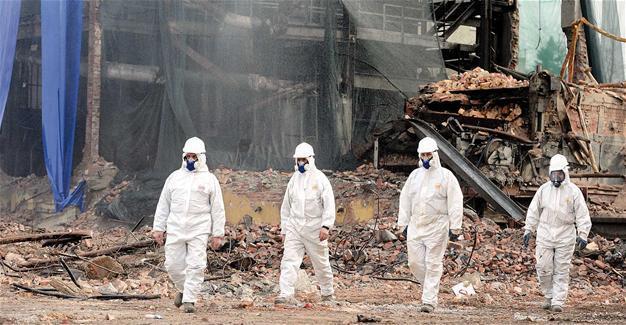Removal of Ankara building bearing tons of asbestos begins under strict measures
ANKARA

The Ankara Municipality has taken wide measures against potential diffusion of asbestos to the air as part of the dismantling work for a decades-old factory in central Ankara, which is certified of bearing 350 tons of the carcinogenic material inside its building.
Measures have been taken for the work that began for the coal gas factory in the Maltepe neighborhood in Ankara, according to a written statement made by the municipality. The office said the removal began from the garage areas and a depot that does not bear asbestos.
As part of the measures, a cover was sealed around the buildings’ parts that have asbestos to ensure the materials stick to it without mixing with air. After the preventive measures are completed, the expert teams will de-assemble the parts of the building that have the material and will vacuum the asbestos dust on them.
After the disassembling and vacuuming works, the teared down parts will be put on special trucks to be taken to a factory in the northwestern province of İzmit, where they will be destroyed.
Speaking about the whole process, which is observed with great caution due to potential health implications it could have on workers and the residents in the area, Ankara Mayor Melih Gökçek said the operation was aimed at “preventing Ankara from a problem and a leakage to which it might be subjected to.”
Meanwhile, Turkish Thorax Association head Ali Fuat Kalyoncu has warned that serious health implications might occur in the environment if the work is carried out without applying the necessary procedures.
Speaking of the health implications that might occur, both for workers carrying out the removal job and the residents in the area, after breathing the air filled with carcinogenic asbestos particulars, Kalyoncu referred to a high probability of cancer that could occur in organs in the thorax area of the human body.
Kalyoncu said with the entrance of the inorganic materials into the human body through respiratory ways, the lungs would be directly or indirectly affected, and due to the fact that the effect of the material does not show itself instantly and could take up to 40 years, it is hard to recognize its symptoms.
He said the use of the material in the construction field was banned in Turkey in 2010, but there was serious concern regarding the constructions built before that date.
He said the building bearing the material should be dismantled in strict accordance with the existing regulations.
“The spread of flax fibers should be prevented. In these kinds of buildings, first the areas with asbestos should be identified and the material should be cleared of as much as possible. The dismantled material having flax inside, should be carried away with special covers and should be thrown to the special earthwork areas that are separated from regular earthwork areas. After this process, the building that was cleared off the material should be dismantled after being dampened in line with the regulations. If the dampening work is not carried out regularly, the flowing water can spread to the environment, and after it gets dry, it may be detrimental for the environment,” he said.
 The Ankara Municipality has taken wide measures against potential diffusion of asbestos to the air as part of the dismantling work for a decades-old factory in central Ankara, which is certified of bearing 350 tons of the carcinogenic material inside its building.
The Ankara Municipality has taken wide measures against potential diffusion of asbestos to the air as part of the dismantling work for a decades-old factory in central Ankara, which is certified of bearing 350 tons of the carcinogenic material inside its building.